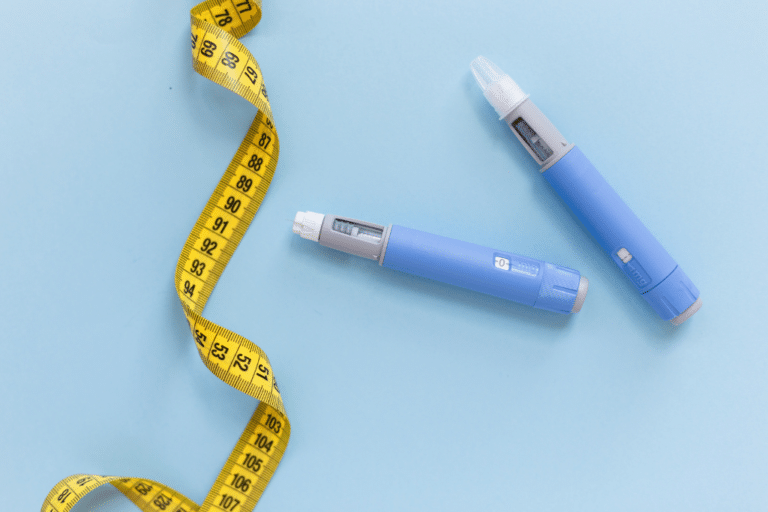 More than 20 million Americans have thyroid disease, but 60% are unaware of it. And most of them are women who begin having problems in perimenopause. This is problematic because thyroid problems can worsen or be worsened by all of the other hormone imbalances that pop up during this time and begin to affect cardiovascular and gut health as well. And its function (or lack thereof), makes a huge difference in your vitality and functioning.
More than 20 million Americans have thyroid disease, but 60% are unaware of it. And most of them are women who begin having problems in perimenopause. This is problematic because thyroid problems can worsen or be worsened by all of the other hormone imbalances that pop up during this time and begin to affect cardiovascular and gut health as well. And its function (or lack thereof), makes a huge difference in your vitality and functioning.
What exactly is your thyroid? And what are some signs or symptoms of a problem with your thyroid?
Welcome to Thyroid 101 – where I cover everything you wanted to know (and more) about this tiny, but powerful gland in your body.
What is Your Thyroid?
The thyroid is a small, butterfly-shaped gland in your lower neck. It is part of your endocrine system, which makes hormones. The thyroid gland makes hormones that regulate your body’s metabolism. These include 4 different hormones, but for the purposes of our discussions, we’ll be focusing on T3 and T4. T4 is inactive and needs to be converted to T3, the active form of thyroid hormone. Problems arise when your body either produces too much or too little of these hormones.
Sluggish Thyroid, Sluggish Everything
Hypothyroidism happens when your thyroid gland is underactive, and your body can’t produce enough thyroid hormone (T4). When your thyroid hormones are low, your pituitary gland will produce more TSH (thyroid-stimulating hormone). TSH cues the thyroid gland to produce more thyroid hormones. Hashimoto’s thyroiditis, surgery to remove the thyroid gland, or damage from radiation treatment can cause hypothyroidism.
Too little thyroid hormone can lead to symptoms such as:
- fatigue
- dry skin
- increased sensitivity to cold
- memory problems
- constipation
- depression
- weight gain
- anxiety
Hashimoto’s thyroiditis is the most common cause of hypothyroidism in the United States. We are not going to extensively cover Hashimoto’s today because I will be covering this in future blog posts. Today, I just want you to understand that Hashimoto’s is an autoimmune disorder where the body attacks its own thyroid gland, which then leads to hypothyroidism.
What is hyperthyroidism?
The most common cause of hyperthyroidism is Graves’ disease, another autoimmune disorder that also attacks the thyroid gland. In hyperthyroidism, this attack leads to overproduction as opposed to an underproduction of thyroid hormone. Nodules or lumps in the thyroid gland cause another type of hyperthyroidism. This condition is known as toxic nodular or multinodular goiter.
Too much thyroid hormone can lead to symptoms like:
- anxiety
- irritability
- hand tremors
- increased or irregular heartbeat
- excessive sweating
- weight loss
- insomnia
- diarrhea or frequent bowel movements
- irregular menstrual cycle
- goiter (enlargement of the thyroid gland)
- bulging eyes
One of the most important things to remember is symptoms of thyroid disease can be variable, and the best way to diagnose the disease is through a blood test.
How Do You Diagnose Thyroid Disease?
Thyroid disease is diagnosed by symptoms, a physical exam, and blood tests. Your doctor is likely to only check TSH and call it “normal” as long as it falls between 0.5 and 5.0 Do not settle for this! You really need a FULL thyroid panel to see the whole picture. This would include TSH, thyroid hormones ( free T3, free T4, and reverse T3), and thyroid antibodies (TPO and thyroglobulin).
What is a Thyroid Antibody Test?
A thyroid antibody test measures the level of thyroid antibodies (TPO and thyroglobulin) in your blood. Antibodies are proteins the immune system makes to fight foreign substances like viruses and bacteria. In an autoimmune response, your antibodies attack your body’s own cells, tissues, and organs by mistake. Remember when we discussed Hashimoto’s and Graves’ disease? These diseases are both examples of an autoimmune disorder of the thyroid.
Some people who have symptoms of thyroid disease may not have abnormal results on the lab tests mentioned above. In this case, it may be necessary to have a thyroid ultrasound to check for any abnormalities of the thyroid.
What are Some Common Treatments of Thyroid Disease?
Once diagnosed with thyroid disease, individuals can move on to the treatment of their disease. Treatment options for both hypothyroidism and hyperthyroidism are usually well-tolerated and can bring great relief to suffering individuals.
How is hypothyroidism treated?
- Synthetic thyroxine– pure synthetic thyroxine (T4) taken once daily successfully treats the symptoms of hypothyroidism in most patients. Some patients may need the addition of T3 to feel completely normal.
- Desiccated animal thyroid– Desiccated (dried and powdered) animal thyroid, mainly obtained from pigs, was the most prevalent form of thyroid therapy before the individual active hormones were created. It is prescribed less frequently today, but some individuals do find relief from this type of therapy.
- Treatment of Hashimoto’s– starts with the removal of gluten from the diet. There is a strong link between Hashimoto’s and gluten sensitivity.
Thyroid supplements are best absorbed on an empty stomach. Most people take it first thing in the morning, but there is data that suggests taking it at night yields better results. The important thing is to take it at the same time every day. Your doctor can adjust doses more effectively if you do.
How is hyperthyroidism treated?
- Antithyroid drugs– such as methimazole or propylthiouracil (PTU) block the thyroid gland’s ability to make new thyroid hormones.
- Radioactive iodine– destroys overactive thyroid cells.
- Surgery– the thyroid gland is removed to eliminate hyperthyroidism. After surgery, patients require thyroid hormone medication.
- Beta-blockers– don’t affect the level of thyroid hormone, but control symptoms of hyperthyroidism; such as racing heart, shakiness, or nervousness.
In Summary
The thyroid gland is one powerful, very important part of our overall healthy functioning. Disorders of the thyroid gland most often cannot be prevented, but the good news is that once a condition is identified and treated, you’ll likely feel much better.
I’ll be covering other thyroid-related topics this month, so stay tuned!
Dr. Anna Garrett is a menopause expert and Doctor of Pharmacy. She helps women who are struggling with symptoms of perimenopause and menopause find natural hormone balancing solutions so they can rock their mojo through midlife and beyond. Dr. Anna is the author of Perimenopause: The Savvy Sister’s Guide to Hormone Harmony. Order your copy at www.perimenopausebook.com.
Dr. Anna is available for 1-1 consultation. Find out more at www.drannagarrett.com/lets-talk




